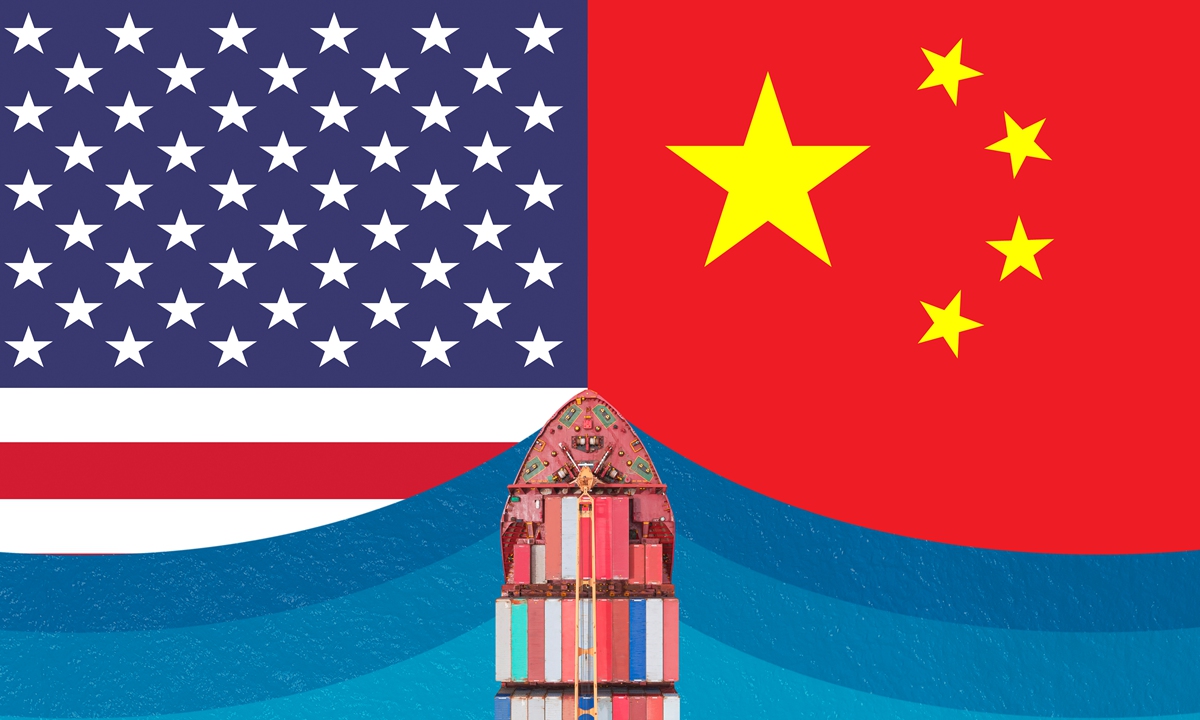
China-US Graphic: GT
The office of the US Trade Representative (USTR) announced plans to extend tariff exclusions on some Chinese products based on Section 301 investigations, which attempted to seek alternative sources of certain products from China, while analysts said that the availability of alternatives is limited.
Experts pointed out that the tariff exclusion extension showed that it is difficult for the US to reduce reliance on Chinese products in light of globalized industrial chains, and any trade barrier put up by the US can only disrupt the stability of the global market.
Gao Lingyun, an expert at the Chinese Academy of Social Sciences who closely follows China-US economic and trade issues, told the Global Times on Sunday that nearly 70-80 percent of products that the US imports from China cannot be replaced, and replaceable products might be manufactured with China-made components.
"Based on various categories of products, consumers and companies from China and the US will all bear different scales of the burden from additional tariffs, and it will damage the global supply chain," Gao noted.
The USTR's notice released on Friday (US time) stated that the current 429 product specific exclusions, including 352 previously reinstated exclusions and 77 pandemic-related exclusions, listed in the Section 301 investigation and set to expire on May 31, this year will be provided a 14-day transition period through June 14, and some certain exclusions will be extended to May 31, 2025.
The notice will exclude some Chinese products such as animal-feeding machinery, electric motors, blood pressure monitors and thermostats designed for air conditioning or heating systems not connected to the internet, according to a Reuters report.
The USTR said the extension will help move sourcing away from China, or give more time if it is hard to find the product from other sources outside of China.
Tariff exclusion for 102 categories will not be extended, as public comments demonstrated that there was no evidence to show that exclusions would aid efforts to shift sourcing certain products out of China in the near term or that certain products are unavailable outside of China, said the USTR.
The Section 301 investigation was launched by former US president Donald Trump in 2018 to start a trade war against China.
Starting in March 2018, Trump imposed tariffs on Chinese imports valued at $370 billion and restricted Chinese investment, according to media reports.
In September 2020, a WTO panel ruled that the Section 301 tariffs violated WTO rules.
Washington on May 14 announced
further increased tariffs on a variety of imports from China, including electric vehicles (EVs), lithium batteries, photovoltaic cells, critical minerals, steel and aluminum, semiconductors and port cranes, on top of existing tariffs under Section 301.
Chinese business associations in related industries strongly opposed the US' abuse of Section 301 to impose additional tariffs on Chinese products, noting that they would ultimately be borne by US consumers and hinder efforts to ease inflation in the US.
Chinese Foreign Ministry spokesperson Wang Wenbin said in a regular press conference on May 15 that 92 percent of the cost of the tariff hikes falls on US consumers and average US household expenditure increases by $1,300 annually, noting that the protectionist US measures will further damage the security and stability of global industrial and supply chains.
In contrast to the trade protectionism of the US, China keeps advancing international cooperation and opening-up.
EV maker
Tesla broke ground on a Megafactory in Shanghai on Thursday, marking the company's first energy storage system factory outside the US to manufacture its energy storage batteries known as Megapacks, and the negotiation and signing of the factory agreement took only one month - a new speed record.
Elon Musk's investment plan can be seen as a global benchmark, because his companies focus on cutting-edge technology demand and advance primary industries, showing the China market's leading attractiveness, Hu Qimu, a deputy secretary-general of the digital-real economies integration Forum 50, told the Global Times on Sunday.
Following the continuous US tariffs on Chinese EVs, Musk on Thursday said at the Viva Technology conference in Paris via video link that "neither Tesla nor I asked for these tariffs, in fact I was surprised when they were announced," noting that "Tesla competes quite well in the market in China with no tariffs and no deferential support. I'm in favor of no tariffs."
Hu emphasized that China will not slow down the pace of opening-up despite Western countries' "small yard, high fence" strategy and "decoupling" policies.
"China will provide its huge-sized market as a public resource to the world to attract global capital and technology, and this trend will not be disrupted," said Hu.




